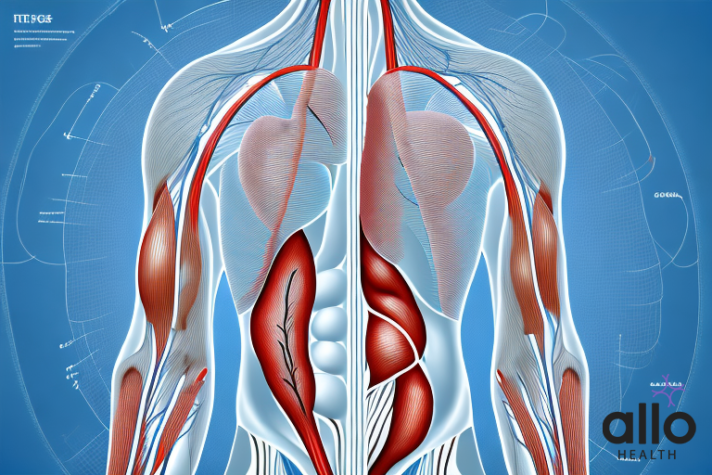What Causes Erection?

Allo Health is dedicated to personalized well-being, offering support and trusted information tailored to individual health goals. The platform emphasizes human-generated content, led by a distinguished medical team of experts, including physicians and sexual health specialists. Their commitment to credibility involves rigorous fact-checking, authoritative research, and continuous updates to ensure accurate, up-to-date information. Allo Health's unique approach goes beyond conventional platforms, providing expert-led insights and a continuous commitment to excellence, with user feedback playing a crucial role in shaping the platform's authoritative voice.

Dr. Aditi completed her undergraduate medical education at AJIMS, Mangalore, after which she worked in multi-speciality hospitals with COVID patients and in the Pain and Palliative medicine department. Driven by her experiences, she developed a keen interest in psychiatry. Dr. Aditi believes that mental health is just as, if not more important, than physical health.
Why This Was Upated?
Our experts continually monitor the health and wellness space, and we update our articles when new information became available.
Updated on 17 April, 2024
- Article was updated as part of our commitment to diversity, equity, and inclusion.

"The following blog article provides general information and insights on various topics. However, it is important to note that the information presented is not intended as professional advice in any specific field or area. The content of this blog is for general educational and informational purposes only.
Book consultation
The content should not be interpreted as endorsement, recommendation, or guarantee of any product, service, or information mentioned. Readers are solely responsible for the decisions and actions they take based on the information provided in this blog. It is essential to exercise individual judgment, critical thinking, and personal responsibility when applying or implementing any information or suggestions discussed in the blog."
Understanding the intricacies of male sexual health is crucial, and in this article, we delve into the physiological factors that contribute to erections. From the role of blood flow to the influence of hormones, we explore the science behind what causes this fundamental aspect of male anatomy.
What is an Erection?
- An erection is a physiological response where increased blood flow swells up the penile tissues, resulting in the stiffening and enlargement of the penis.
- This natural process is a key element of male sexual function.
What Causes an Erection?
An erection is caused by various physiological processes taking place. They are as follows:
- Blood Flow: The process begins with an increase in blood flow to the penile region, supplying oxygen and nutrients necessary for arousal.
- Arterial Dilation: Arteries leading to the penis undergo dilation, allowing more blood to flow into the erectile tissues, creating pressure.
- Smooth Muscle Relaxation: The smooth muscles within the penis relax, enabling the arteries to widen further and facilitating blood engorgement.
- Hormonal Influence: Testosterone, a key male sex hormone, is pivotal. It stimulates the production of nitric oxide, a vasodilator that aids in blood vessel relaxation.
- Nervous System Activation: Sexual stimulation triggers the release of neurotransmitters that stimulate the nerves in the penile tissues, initiating a series of events leading to erection.
- Psychological Factors: Mental arousal, whether through visual, auditory, or emotional stimuli, signals the brain to send messages that contribute to the overall arousal process.
- Venous Constriction: To sustain an erection, veins that normally carry blood away from the penis experience constriction, preventing the rapid outflow of blood and maintaining the stiffness of the erectile tissues.

The Physiological Process Behind an Erection
Sexual Stimulation
- Sexual arousal is a complex psychological and physiological response triggered by stimuli like sensual thoughts, visual cues, or emotional connection.
- These stimuli activate the brain’s arousal centers, setting the stage for a series of interconnected physiological processes.
Nervous System Activation
- As sexual stimulation occurs, the nervous system responds by releasing neurotransmitters, particularly nitric oxide.
- The spinal cord plays a crucial role in erection through its involvement in the transmission of nerve signals. Sensory stimuli related to sexual arousal are detected by peripheral nerves, which send signals to the spinal cord. The spinal cord then relays these signals to the brain, initiating a complex neural response that involves the release of neurotransmitters, ultimately leading to the physiological processes that result in an erection.
- Nitric oxide acts as a signaling molecule, communicating the need for increased blood flow to the penis.
Arterial Dilation
- Nitric oxide signals the arteries leading to the penis to dilate or widen.
- This arterial dilation is essential for facilitating a higher volume of blood to flow into the penile tissues, creating the conditions necessary for an erection.
Smooth Muscle Relaxation
- The increased blood flow induces the smooth muscles within the penis to relax.
- This relaxation is a key step as it allows for the expansion of the penile blood vessels, accommodating the influx of blood required for an erection.
Engorgement of Erectile Tissues
- With smooth muscles relaxed, the spongy tissues of the penis become engorged with blood.
- This engorgement leads to the physical manifestation of an erection, where the penis becomes stiff and enlarged.
Hormonal Influence (optional)
- Testosterone, the primary male sex hormone, can contribute to the process by enhancing nitric oxide production.
- This hormonal influence supports the dilation of arteries, aiding in the overall vasodilation necessary for an erection.
Venous Constriction
- To sustain the erection, veins that would typically carry blood away from the penis experience constriction.
- This constriction prevents a rapid outflow of blood, ensuring that the engorged state of the erectile tissues is maintained, allowing for a sustained period of sexual activity.
- The delicate balance of these physiological processes ensures a functional and dynamic response to sexual stimuli.
Role of Testosterone in Erection
Testosterone, the primary male sex hormone, plays a crucial role in the physiological processes leading to an erection. Here’s a breakdown of its role:
- Testosterone influences the production of nitric oxide, a key signaling molecule. Nitric oxide plays a central role in the process by signaling the dilation of arteries leading to the penis.
- Nitric oxide, under the influence of testosterone, promotes vasodilation. This is the widening of blood vessels, including those in the penile region. Vasodilation is essential for allowing an increased flow of blood to the erectile tissues of the penis.
- The combination of increased nitric oxide production and vasodilation ensures a more efficient blood flow to the penis. This heightened blood flow is a critical factor in creating the conditions necessary for an erection to occur.
- Testosterone also contributes to the relaxation of smooth muscles within the penis. This relaxation is vital for accommodating the increased blood flow and facilitating the subsequent engorgement of the erectile tissues.

Health-Related Factors Affecting Erections
- Erectile Dysfunction (ED): Persistent difficulty achieving or maintaining an erection sufficient for sexual activity.
- Cardiovascular Disease: Conditions like atherosclerosis can impede blood flow, affecting the ability to achieve or sustain an erection.
- Diabetes: Uncontrolled diabetes can damage blood vessels and nerves, contributing to erectile difficulties.
- Neurological Disorders: Conditions such as multiple sclerosis or Parkinson’s disease can impact nerve function involved in erections.
- Hormonal Imbalances: Low levels of testosterone or imbalances in hormones can influence erectile function.
- Psychological Factors: Stress, anxiety, depression, or relationship issues can contribute to temporary or chronic erectile concerns.
- Medications: Some drugs, such as certain antidepressants or blood pressure medications, may have side effects affecting erections.
- Smoking: Tobacco use can damage blood vessels and hinder blood flow, impacting erectile function.
- Alcohol and Substance Abuse: Excessive use of alcohol or certain substances can contribute to erectile difficulties.
- Peyronie’s Disease: Scar tissue formation in the penis can cause curvature and affect erections.
- Obesity: Being overweight can contribute to conditions like diabetes and cardiovascular disease, both of which impact erectile function.
- Prostate Concerns: Conditions such as prostate cancer or an enlarged prostate can affect nerves and blood flow involved in erections.
Psychological Factors Affecting Erections
- Stress: High stress levels can trigger the release of hormones that interfere with the physiological processes essential for erections.
- Anxiety: Performance anxiety or general anxiety can create mental tension, affecting the ability to achieve or sustain an erection.
- Depression: Mental health conditions, including depression, may contribute to a decreased interest in sexual activity and impact erectile function.
- Relationship Issues: Strained relationships, communication problems, or emotional disconnection can manifest in sexual difficulties, including erectile concerns.
- Self-Esteem: Low self-esteem or body image issues can influence confidence in sexual performance, potentially leading to erection concerns.
- Performance Pressure: The fear of not meeting perceived expectations or performance standards can contribute to erectile difficulties.
- Past Trauma: Previous traumatic experiences, especially of a sexual nature, can have lasting effects on sexual function and contribute to erection concerns.
- Body Image Concerns: Negative perceptions of one’s body can impact overall sexual satisfaction and influence the likelihood of experiencing erectile concerns.
Lifestyle Factors Affecting Erections
- Smoking: Tobacco use damages blood vessels, reducing blood flow to the penis and increasing the risk of erectile dysfunction.
- Alcohol and Substance Abuse: Excessive alcohol consumption and certain substances can impair nerve function and contribute to erectile difficulties.
- Obesity: Being overweight can lead to conditions like diabetes and cardiovascular disease, both of which are linked to erectile dysfunction.
- Poor Diet: A diet high in saturated fats and low in nutrients can contribute to cardiovascular issues, impacting blood flow to the penis.
- Lack of Exercise: Sedentary lifestyles can contribute to obesity and cardiovascular problems, both of which are risk factors for erectile dysfunction.
- Lack of Sleep: Chronic sleep deprivation can disrupt hormonal balance, potentially affecting sexual function.
- High Stress Levels: Chronic stress can lead to hormonal imbalances and negatively impact overall sexual health, including erectile function.
- Unhealthy Lifestyle Choices: Overall unhealthy lifestyle habits, such as poor sleep, lack of exercise, and a nutritionally deficient diet, can contribute to the development of erectile difficulties.
Key Takeaways
- Understanding male sexual health involves exploring physiological factors contributing to erections, encompassing blood flow and hormonal influences.
- An erection is a response to increased blood flow, swelling the penile tissues and is integral to male sexual function.
- Physiological processes leading to an erection involve sexual stimulation, nervous system activation, arterial dilation, smooth muscle relaxation, hormonal influence, psychological factors, and venous constriction.
- Testosterone, the primary male sex hormone, plays a crucial role in erection by influencing nitric oxide production, supporting vasodilation, and relaxing smooth muscles.
- Various health factors can affect erections, including erectile dysfunction, cardiovascular disease, diabetes, neurological disorders, hormonal imbalances, psychological factors, medications, smoking, alcohol/substance abuse, Peyronie’s disease, obesity, and prostate concerns.
Frequently Asked Questions
Q: What is Erectile Dysfunction?
A: Erectile Dysfunction (ED) is a condition characterised by the persistent inability to achieve or maintain an erection firm enough for sexual activity. It often involves difficulties in getting an erection, maintaining it throughout sexual intercourse, or both. ED can result from various factors, including physical health issues like cardiovascular disease, diabetes, and hormonal imbalances, as well as psychological factors such as stress, anxiety, or relationship problems. Treatment options range from lifestyle changes and medications to psychological counseling and, in some cases, surgical interventions. Seeking medical advice is essential for an accurate diagnosis and appropriate management of erectile dysfunction.
Q: Can emotional factors affect an erection?
A: Yes, emotional factors can significantly impact erections. Stress, anxiety, and relationship issues can interfere with the psychological processes involved in sexual arousal, potentially leading to difficulties in achieving or maintaining an erection. Addressing and managing these emotional factors is crucial for maintaining healthy sexual function.
Q: Can surgeries affect penile erections?
A: Yes, certain surgeries can impact penile erections. Procedures involving the pelvic or genital area, such as prostate surgery or surgeries for urinary incontinence, may affect nerves and blood vessels crucial for erectile function. It’s essential to discuss potential effects on sexual health with healthcare providers before undergoing such surgeries.
Q: Can heart disease affect erections?
A: Yes, heart disease can affect erections. Conditions like atherosclerosis can impede blood flow, compromising the ability to achieve and maintain a satisfactory erection, highlighting the interconnectedness of cardiovascular health and erectile function.
Q: Why am I experiencing prolonged erection?
A: Prolonged erections, known as priapism, can result from various factors, including medications, blood disorders, or neurological issues. It’s crucial to seek immediate medical attention, as untreated priapism can lead to complications such as tissue damage and erectile dysfunction.






































